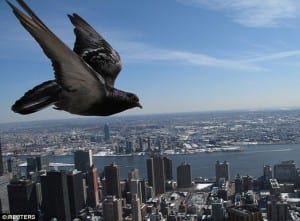
by Pigeon Patrol | Jun 4, 2016 | Bird Netting, Pigeon Patrol's Services, Pigeon Spikes
 China’s air pollution can be so dense that grey plumes are visible from space.
China’s air pollution can be so dense that grey plumes are visible from space.
But while smog can cause heart disease, lung cancer and high blood pressure in humans, it seems to make homing pigeons fly faster in one of China’s most hazy regions.
The researchers think the unexpected phenomenon may be down to a scent the birds can use to find their way home.
While smog can cause heart disease, lung cancer and high blood pressure in humans, it seems to make homing pigeons fly faster in one of China’s most hazy regions. A stock image of smog in Shanghai is pictured
Researchers from Nanjing University in China and the University of California, Los Angeles, analysed the performance of racing or ‘homing’ pigeons taking part in races on the North China Plain.
The birds are known for their ability to find their way back home at speeds of around 37mph (60km/h) and were famously used in both World Wars because of their reliability.
The researchers used publicly available data gathered from pigeon racing agencies as well as environmental organisations in the autumns of 2013 and 14 to analyse the speed of the birds in the region, where smog is usually thicker than in other parts of the vast country.
When looking for correlations between the birds’ times and pollution levels, they expected to see a drop in performance.
The researchers used publicly available data from pigeon racing agencies as well as environmental organisations to analyse the speed of the birds. Contrary to their expectations, pigeons homed significantly faster in polluted conditions. These charts show the varying correlations depending on other conditions
WHY DO THE PIGEONS FLY FASTER?
Navigational advantage:
The smell of smog, which is composed of organic particles in China, may help the birds navigate.
‘While air pollution cannot enhance vision, it might enhance olfactory navigation efficiency by providing supplemental olfactory cues to home,’ the study says.
Motivation:
Alternatively, the researchers think the birds dislike the smog and are simply upping their speed to fly out of it as soon as possible.
‘Decreased homing time under air pollution could be explained by an enhanced motivation to home; a possibility proposed several years ago that remains untested,’ they write.
‘Air pollution might be an indication of poor environmental quality, which might trigger rapid escape.’
The birds many want to get out of the smog to avoid predators surprising them in poor visibility too.
‘By homing faster when flying through haze pollution, pigeons reduce the relative amount of time they are exposed to harmful or dangerous situations while away from the safety of their home roosts,’ the study said.
‘We might expect pollution would negatively interfere with pigeon navigation and pigeons would both fly more slowly and be less successful at returning to their home roosts when flying through more polluted air,’ the researchers wrote in the study, published in Nature’s Scientific Reports.
They considered variables including race distance, wind direction, speed, weather conditions and air quality.
Temperature was found to have no ‘significant’ effects on homing time, whereas the others either slowed the birds down or helped them get to their destination more swiftly.
The researchers added: ‘Contrary to our expectations, pigeons homed significantly faster when flying through more polluted conditions.’
Using a model, they estimated that pigeons increase their homing speed from 35 mph (55.6km/h) when flying in unpolluted conditions, to 42 mph (68.2km/h) when the pollution index hit a high score of 500.
While they are not exactly sure why smog is responsible for the performance boost, they have a couple of ideas to do with navigation and motivation.
It is generally accepted that pigeons use the sun and geomagnetic field as a compass, and visual and olfactory cues to create a map.
‘Could air pollution enhance pigeon visual and/or olfactory abilities, and by doing so explain the reduced homing time?’ the experts asked in their paper.
Because smog usually reduces visibility, particularly in North China where smoggy particles are the main pollutants, the study suggests that visual cues aren’t as important to the birds’ navigational techniques as expected, so poor visibility didn’t affect their speed.
While the experts are not exactly sure why smog is responsible for the performance boost, they suggest that the birds may fly faster than usual – and not just as efficiently – because of the smell of smog. A stock image of racing pigeons being released is shown
‘This finding is consistent with previous studies that have shown that pigeons are able to home perfectly well from unknown sites where landmarks are unfamiliar, even when flying with frosted lenses that impede vision,’ they write.
To explain why the birds may fly faster than usual – and not just as efficiently – they suggested the racing pigeons may be stimulated by the smell of smog.
‘Olfactory cues have been shown to play an important role in avian navigation, and in pigeons it is probably a fundamental homing mechanism,’ they write.
They think the organic particles that make up the smog – from burning coal and waste – may help the birds navigate by providing stronger markers for the birds to use when finding their way home.
Racing pigeons are known for their ability to find their way back home at speeds of around 37mph (60km/h) and were famously used in both World Wars because of their reliability (pictured)
‘While air pollution cannot enhance vision, it might enhance olfactory navigation efficiency by providing supplemental olfactory cues to home,’ the study continued.
Alternatively, they suggested the birds might dislike the smog and are simply upping their speed to fly out of it and get back home as soon as possible.
‘Decreased homing time under air pollution could be explained by an enhanced motivation to home; a possibility proposed several years ago that remains untested,’ they write.
‘Air pollution might be an indication of poor environmental quality, which might trigger rapid escape.’
The birds many want to get out of the smog to avoid predators surprising them in poor visibility too.
‘By homing faster when flying through haze pollution, pigeons reduce the relative amount of time they are exposed to harmful or dangerous situations while away from the safety of their home roosts,’ the study said.
About Pigeon Patrol:
Pigeon Patrol Products & Services is the leading manufacturer and distributor of bird deterrent (control) products in Canada. Pigeon Patrol products have solved pest bird problems in industrial, commercial, and residential settings since 2000, by using safe and humane bird deterrents with only bird and animal friendly solutions. At Pigeon Patrol, we manufacture and offer a variety of bird deterrents, ranging from Ultra-flex Bird Spikes with UV protection, Bird Netting, 4-S Gel and the best Ultrasonic and audible sound devices on the market today.
Voted Best Canadian wholesaler for Bird Deterrent products four years in a row.
Contact Info: 1- 877– 4– NO-BIRD (www.pigeonpatrol.ca)
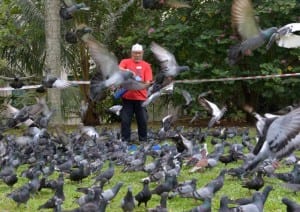
by Pigeon Patrol | Jun 1, 2016 | Bird Deterrent Products, Bird Netting, Pigeon Spikes
 AROUND New Year some Yorkshire farmers and landowners hold the first of what have become traditional shoots at woodpigeon roosts.
AROUND New Year some Yorkshire farmers and landowners hold the first of what have become traditional shoots at woodpigeon roosts.
The bird is the most common found on UK farmland, and the huge resident population is boosted each autumn by migrants from the Continent. In some areas the shoots are a necessity owing to the woodpigeon’s destructive effect on crops. For example, one large flock – some are as many as 2,000-strong – can take out a field of sprouts or cabbages in a day. They also hammer crops like corn and rape.
A few years back I was invited to describe a shoot on one estate, which must remain nameless for fear of attracting animal rights campaigners. By tradition, the first shoot of the winter took place on the final Saturday of December, and after issuing an invite to friends and neighbours the farmer never knew how many guns to expect. Sometimes as many as 25 to 30 turned up.
It helped if there wasn’t much beechmast left, apparently, because when the birds are still finding plenty to eat in beechwoods there are fewer on farmland.
The woodpigeons started flying back to their evening roost in mature conifers about two in the afternoon, by which time everyone was in place beneath trees the birds were known to use year after year. There was no real need for stealth at that point since the pigeons were still out in the fields.
Every corner of the plantations had to be staked out, because once the first shot is heard the birds quickly try to find sanctuary. The guns positioned themselves in any woodland gaps which the birds would fly over on arrival or departure. Others went 50 yards or so outside the wood and tucked themselves behind a hedge.
That particular day there was a stiff northerly blowing and a bit of sleet, which the farmer said was good. Without wind, the pigeons would fly in very high and eventually drop down to their roost almost vertically. If the guns weren’t directly underneath them, they wouldn’t have much chance of a shot.
To begin with there seemed to be a lull, a calm before the storm, when there was no movement in either sky or trees, then suddenly there came lots of banging, pop-pop-pop-pop in the distance, and the sky was full of wings.
Sometimes, as a shot was fired, the bird disappeared behind branches and the gun stood listening carefully to hear the noise of it clattering down through branches and thumping onto the ground. There was usually some visual evidence of a hit, since woodpigeons have quick-release feathers which are thought to be an anti-predator device.
On that particular day the total birds shot reached three figures. Yet the farmer who had organised the shoot said ruefully: “It’s supposed to be all about pest control, but you would scarcely notice any reduction. The very next day these woods are usually blue with pigeons again.”
About Pigeon Patrol:
Pigeon Patrol Products & Services is the leading manufacturer and distributor of bird deterrent (control) products in Canada. Pigeon Patrol products have solved pest bird problems in industrial, commercial, and residential settings since 2000, by using safe and humane bird deterrents with only bird and animal friendly solutions. At Pigeon Patrol, we manufacture and offer a variety of bird deterrents, ranging from Ultra-flex Bird Spikes with UV protection, Bird Netting, 4-S Gel and the best Ultrasonic and audible sound devices on the market today.
Voted Best Canadian wholesaler for Bird Deterrent products four years in a row.
Contact Info: 1- 877– 4– NO-BIRD (www.pigeonpatrol.ca)
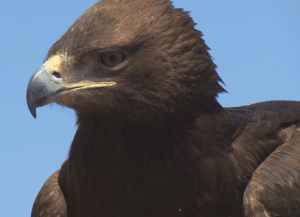
by Pigeon Patrol | May 31, 2016 | Bird Deterrent Products, Bird Netting, Pigeon Patrol's Services, Pigeon Spikes
 PIGEONS in Poundbury beware.
PIGEONS in Poundbury beware.
This falcon is sweeping the skies to keep them clear from marauding birds.
Amateur photographer Sheila Hunn captured this stunning shot of the bird on a visit to Poundbury Garden Centre recently.
Sheila, 63, of Portland, said she was ‘thrilled to bits’ when she saw the photo.
“I was lucky enough to see the falcon with her handler. He told me she is flown regularly to keep the pigeons away and was kind enough to let me take a few photos.
“She is well trained and raised her wings on command from him.”
The bird is a cross between a peregrine falcon and a lanner falcon.
Sheila, a retired midwife, added: “She was a beautiful bird, standing there very proudly. I think she’s there most days. I’ve usually got my camera with me but I was lucky to get such nice shots.”
About Pigeon Patrol:
Pigeon Patrol Products & Services is the leading manufacturer and distributor of bird deterrent (control) products in Canada. Pigeon Patrol products have solved pest bird problems in industrial, commercial, and residential settings since 2000, by using safe and humane bird deterrents with only bird and animal friendly solutions. At Pigeon Patrol, we manufacture and offer a variety of bird deterrents, ranging from Ultra-flex Bird Spikes with UV protection, Bird Netting, 4-S Gel and the best Ultrasonic and audible sound devices on the market today.
Voted Best Canadian wholesaler for Bird Deterrent products four years in a row.
Contact Info: 1- 877– 4– NO-BIRD (www.pigeonpatrol.ca)
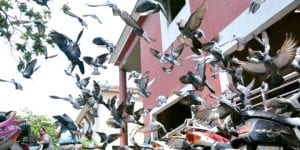
by Pigeon Patrol | May 23, 2016 | Bird Netting, Pigeon Spikes
 PIGEONS that congregate outside Masjid Haji Muhammad Salleh mosque have been getting an extra ingredient in their breakfast.
PIGEONS that congregate outside Masjid Haji Muhammad Salleh mosque have been getting an extra ingredient in their breakfast.
Every day, pigeons that flock to the area are served a corn-based feed containing a drug called nicarbazin, which stops the female birds from developing eggs or causes them to lay eggs that do not hatch.
This is a new “birth control” method to limit pigeon numbers tested by the Agri-Food and Veterinary Authority of Singapore (AVA), at a field outside the mosque at Palmer Road near Shenton Way.
The trial, which started on Oct 13 and will last a year, comes on the back of soaring complaints about the nuisance caused by pigeons.
AVA has already received about 3,400 pieces of pigeon-related feedback from Jan to Oct this year, more than the 2,500 they received in the whole of last year and the 2,100 in 2013.
It has also seen a growth in feedback about all kinds of birds, including pigeons, from some 4,400 messages in 2013 to 6,100 in the first 10 months of this year alone.
Mohamed Idris, secretary of the management board of the mosque at Palmer Road, said pigeons have always been around, but the problem worsened over the last 10 years.
The field outside the mosque has an estimated 400 pigeons, twice as many as two years ago. The birds would fly into the mosque compounds, making them a nuisance to staff and people who go to the mosque to pray.
“They leave their droppings on the floor and you walk on it… They congregate at the food areas as well,” he said.
This has led AVA to choose the mosque as the first area to try out the new method.
During a demonstration yesterday, Janet Chia, executive manager of the Operations (Wild Animals) section at AVA, said it will take about a year to see a drop in the pigeon population there.
Around five mosque volunteers will be in charge of feeding the laced feed to the pigeons. The method could be rolled out to other areas in Singapore if the trial succeeds.
When tested in Italy, the method was found to reduce the pigeon population there by 30 to 40 per cent over four years.
The drug does not harm the birds and is not toxic to animals or humans if taken in small amounts. It would take 40kg of the feed to see toxic effects in dogs and cats, and 60kg for a child, said Ms Chia.
She also urged the public not to feed birds, as this “would encourage their population size to grow and encourage them to congregate and cause nuisance”.
Feeding pigeons is illegal and those found to flout the rules face a fine of up to $500. AVA has caught 113 bird feeders so far this year, including 13 who did so outside the mosque.
About Pigeon Patrol:
Pigeon Patrol Products & Services is the leading manufacturer and distributor of bird deterrent (control) products in Canada. Pigeon Patrol products have solved pest bird problems in industrial, commercial, and residential settings since 2000, by using safe and humane bird deterrents with only bird and animal friendly solutions. At Pigeon Patrol, we manufacture and offer a variety of bird deterrents, ranging from Ultra-flex Bird Spikes with UV protection, Bird Netting, 4-S Gel and the best Ultrasonic and audible sound devices on the market today.
Voted Best Canadian wholesaler for Bird Deterrent products four years in a row.
Contact Info: 1- 877– 4– NO-BIRD (www.pigeonpatrol.ca)
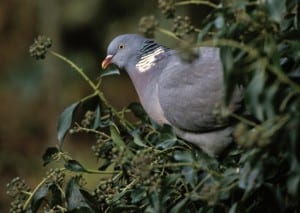
by Pigeon Patrol | May 21, 2016 | Bird Netting, Pigeon Patrol's Services, Pigeon Spikes
 An innovative attempt to deter pigeons from a popular beach using thousands of scented yellow stickers was deemed a success after it avoided being blacklisted under new EU water bathing regulations.
An innovative attempt to deter pigeons from a popular beach using thousands of scented yellow stickers was deemed a success after it avoided being blacklisted under new EU water bathing regulations.
Teignmouth beach in Devon was among 13 beaches which had been expected to fail tough new tests for cleanliness but which managed to make dramatic improvements in order to make the grade.
Twelve beaches failed to meet the new standards, meaning that they must put up signs before the swimming season begins next May advising tourists to stay out of the water.
The move could have serious ramifications for local business and tourism in those much-loved spots, which include Clacton in Essex, East Looe in Cornwall, Walpole Bay in Margate, Kent and Wildersmouth in Ilfracombe, North Devon.
The new EU bathing water regulations raise the “pass mark” for beaches around Europe.
They judge water quality on a four-year average, meaning that 25 beaches identified as ‘at risk’ earlier this year due to poor results in previous years were given the chance to make last-ditch improvements to turn things around.
Among them was Teignmouth, where guano from hundreds of pigeons roosting beneath its pier had become one of the major sources of pollution.
Previous attempts to scare away the pigeons had failed so the council this year resorted to deploying thousands of yellow stickers scented with citronella and garlic at pigeon-width intervals under the pier to try to deter them from roosting.
The project, undertaken with a £15,000 grant from the Environment Agency, significantly reduced the number of pigeon and seagull guano getting into the water.
Blackpool North and Blackpool Central had also faced blacklist, in part due to droppings from donkeys doing tourist rides.
Donkey owners were urged to clean up after the animals to avoid the faeces being left on the sand and washed out to sea.
But the local council said that the main issues, involving sewage, had been eradicated because United Utilities had invested £160million worth of infrastructure improvements.
Agriculture was cited as the main pollutant at several beaches often due to effluent from livestock grazing near streams that feed into the sea, and new cattle fencing was installed to tackle the problem.
Many other beaches had problems from sewage treatment works or sewage overflows.
Although far more beaches managed to avoid blacklist than had been expected, the new regulations mean that only 97 per cent of England’s bathing waters are deemed clean enough to swim in, as opposed to 99.5 per cent last year, when just two spots failed to reach the mandatory grade: Lyme Regis Church Cliff Beach, Dorset, and Staithes, North Yorkshire. Both remain on the blacklist.
In total, 63.6 per cent of bathing waters meet the new “excellent” standard.
Rory Stewart, the Environment Minister, said: “We continue working to further improve the quality of our water, and last year our coast was the cleanest it has ever been.
“Swimming is allowed and all beaches remain open; new EU standards are simply there to advise and inform the public on water quality.
“I want Britain’s beaches, seas and lakes to have the cleanest water in the world. We need everyone to help us achieve this – from Government, water companies and councils to local communities.”
Dr Pete Fox, director of land & water at the Environment Agency added: “Water quality at beaches is better than any time in living memory, with dramatic improvements having been made over the last few decades.
“The Environment Agency has led successful work to monitor, investigate and reduce pollution, which has benefited the environment and people with nearly all of England’s beaches meeting the new stringent water quality standards.”
About Pigeon Patrol:
Pigeon Patrol Products & Services is the leading manufacturer and distributor of bird deterrent (control) products in Canada. Pigeon Patrol products have solved pest bird problems in industrial, commercial, and residential settings since 2000, by using safe and humane bird deterrents with only bird and animal friendly solutions. At Pigeon Patrol, we manufacture and offer a variety of bird deterrents, ranging from Ultra-flex Bird Spikes with UV protection, Bird Netting, 4-S Gel and the best Ultrasonic and audible sound devices on the market today.
Voted Best Canadian wholesaler for Bird Deterrent products four years in a row.
Contact Info: 1- 877– 4– NO-BIRD (www.pigeonpatrol.ca)

by Pigeon Patrol | May 18, 2016 | Bird Netting, Pigeon Spikes, Pigeons in the News, UltraSonic Bird Control
 JAIPUR: A study coordinated by Sawai Man Singh (SMS) Medical College made a startling revelation that pigeons could cause serious respiratory diseases. They said even air-coolers were harmful for lungs.
JAIPUR: A study coordinated by Sawai Man Singh (SMS) Medical College made a startling revelation that pigeons could cause serious respiratory diseases. They said even air-coolers were harmful for lungs.
Feeding pigeons is fine, but constant exposure to them could invite serious diseases like hypersensitivity pneumonitis (HP), says a recent national study coordinated by Sawai Man Singh (SMS) Medical College.
“At least 22% of cases of HP had history of bird (pigeon) exposure,” said Dr Sheetu Singh, assistant professor, Institute of Respiratory Diseases, SMS Medical College, and coordinator, ILD India Registry – a perspective database (March 2012-April 2015).
“Another major finding of the study shows that around 48.8% patients with HP in the registry had exposure to air-coolers,” Dr Singh said.
In Jaipur, pigeons have homes in flats and apartments. Pigeons’ droppings and nesting could be found easily in heritage buildings, flats, apartments, government buildings, which forces residents of the city to remain exposed to such environmental conditions. Over the past few years, more pigeons are being spotted everywhere. “Pigeons’ droppings or pigeon-affected environment is not good for lungs,” Dr Singh said, while talking about the findings of the study.
The ILD India registry is a set of data collected for the very first time in the country from 19 cities including Jaipur by 27 investigators. They managed to collect clinical data from 1,090 patients. In Rajasthan, 400 patients were found suffering from ILD, but the figures could be even higher. The findings further say, “A vast majority of ILD patients (47%) enrolled in this registry were diagnosed with HP, an inflammatory-fibrotic lung disease, caused by inhalation of environmental factors and 71% of patients with HP lived in urban areas.”
The details of the breakthrough findings were presented by former SMS superintendent Dr Virendra Singh in a session during NAPCON 2015, on Friday, and discussed by a panel of experts during the session that was moderated by Dr Ganesh Raghu, director, Centre for ILD, sarcoid and pulmonary fibrosis program, Seattle, USA.
The experts discussed that since the disease is usually unrecognised, one can avoid its progression by preventing further exposure to such environment or surroundings either at home or work place. The findings from the results of the analyses of data gathered by the participating site pulmonologists from their consenting patients across India, is an eye-opener and has implications not only for the public and physicians in India but provides useful insights into the field of ILD in general.
About Pigeon Patrol:
Pigeon Patrol Products & Services is the leading manufacturer and distributor of bird deterrent (control) products in Canada. Pigeon Patrol products have solved pest bird problems in industrial, commercial, and residential settings since 2000, by using safe and humane bird deterrents with only bird and animal friendly solutions. At Pigeon Patrol, we manufacture and offer a variety of bird deterrents, ranging from Ultra-flex Bird Spikes with UV protection, Bird Netting, 4-S Gel and the best Ultrasonic and audible sound devices on the market today.
Voted Best Canadian wholesaler for Bird Deterrent products four years in a row.
Contact Info: 1- 877– 4– NO-BIRD (www.pigeonpatrol.ca)

 China’s air pollution can be so dense that grey plumes are visible from space.
China’s air pollution can be so dense that grey plumes are visible from space.

 AROUND New Year some Yorkshire farmers and landowners hold the first of what have become traditional shoots at woodpigeon roosts.
AROUND New Year some Yorkshire farmers and landowners hold the first of what have become traditional shoots at woodpigeon roosts.
 PIGEONS in Poundbury beware.
PIGEONS in Poundbury beware.
 PIGEONS that congregate outside Masjid Haji Muhammad Salleh mosque have been getting an extra ingredient in their breakfast.
PIGEONS that congregate outside Masjid Haji Muhammad Salleh mosque have been getting an extra ingredient in their breakfast.
 An innovative attempt to deter pigeons from a popular beach using thousands of scented yellow stickers was deemed a success after it avoided being blacklisted under new EU water bathing regulations.
An innovative attempt to deter pigeons from a popular beach using thousands of scented yellow stickers was deemed a success after it avoided being blacklisted under new EU water bathing regulations.